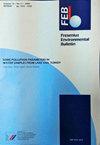马尔马拉海交汇处油轮事故后的风化和溢油模拟。
4区 环境科学与生态学
Q4 Environmental Science
引用次数: 12
摘要
马尔马拉海通过伊斯坦布尔海峡(博斯普鲁斯海峡)与黑海相连,通过恰纳卡莱海峡(达达尼尔海峡)与爱琴海相连,分隔了欧洲和亚洲大陆。海峡和马尔马拉海海上交通量的增加增加了海上事故的风险,自1948年以来,记录了大约700起船舶事故。在本工作的第一阶段,选取马尔马拉海危险区域进行模拟研究。据推测,油轮事故后可能会泄漏1000吨中型原油。然后通过考虑两种不同的风向和规模来确定石油泄漏的时间和空间。模拟代码GNOME用于生成石油泄漏场景。模拟结果表明,前三次模拟中,溢油未到达海岸,第四次模拟中溢油到达海岸。在第二阶段的工作中,使用ADIOS2进行了溢油的风化计算。在这些分析中,估计了油的收支、粘度和空气中的苯。风化计算表明,超过40%的油在0到12小时之间蒸发。本文章由计算机程序翻译,如有差异,请以英文原文为准。
Weathering and oil spill simulations in the aftermath of tanker accidents at the junction points in the Marmara Sea.
Marmara Sea connected to the Black Sea by the Istanbul Strait (Bosporus) and to the Aegean Sea by the Canakkale Strait (Dardanelles), is separating the continents of Europe and Asia. The rise in the volume of maritime traffic on the Strait and the Sea of Marmara has increased the risk of maritime accidents, and around 700 ship accidents have been recorded since 1948. In the first stage of the present work, the risky region of Marmara Sea was chosen for simulation studies. It was assumed that 1000 tons of medium crude oil may be spilled in the aftermath of a tanker accident. The oil spill was then determined with respect to time and space by considering two different wind directions and scales. The simulation code GNOME was utilized to generate the oil spill scenarios. Results of simulation showed that spill did not reach the coast in the first three simulations but reached the coast in the fourth simulation. In the second stage of the work, weathering calculations for spilled oil were carried out by using ADIOS2. In these analyses, oil budget, viscosity and airborne benzene were estimated. Weathering calculations showed that more than 40 % of oil evaporates between 0 and 12 hours.
求助全文
通过发布文献求助,成功后即可免费获取论文全文。
去求助
来源期刊

Fresenius Environmental Bulletin
环境科学-环境科学
自引率
0.00%
发文量
1
审稿时长
4.8 months
期刊介绍:
We edit and proofread academic and research work such as thesis, dissertations, manuscripts, conference proceedings, essays, coursework, letters in the field of agricultural sciences, bio-sciences, medical and health sciences, biomedical sciences, arts, pure and applied sciences, life sciences, humanities, social sciences, education, chemistry, engineering, agriculture, physical sciences, environmental sciences, management sciences, natural sciences and earth sciences.
 求助内容:
求助内容: 应助结果提醒方式:
应助结果提醒方式:


